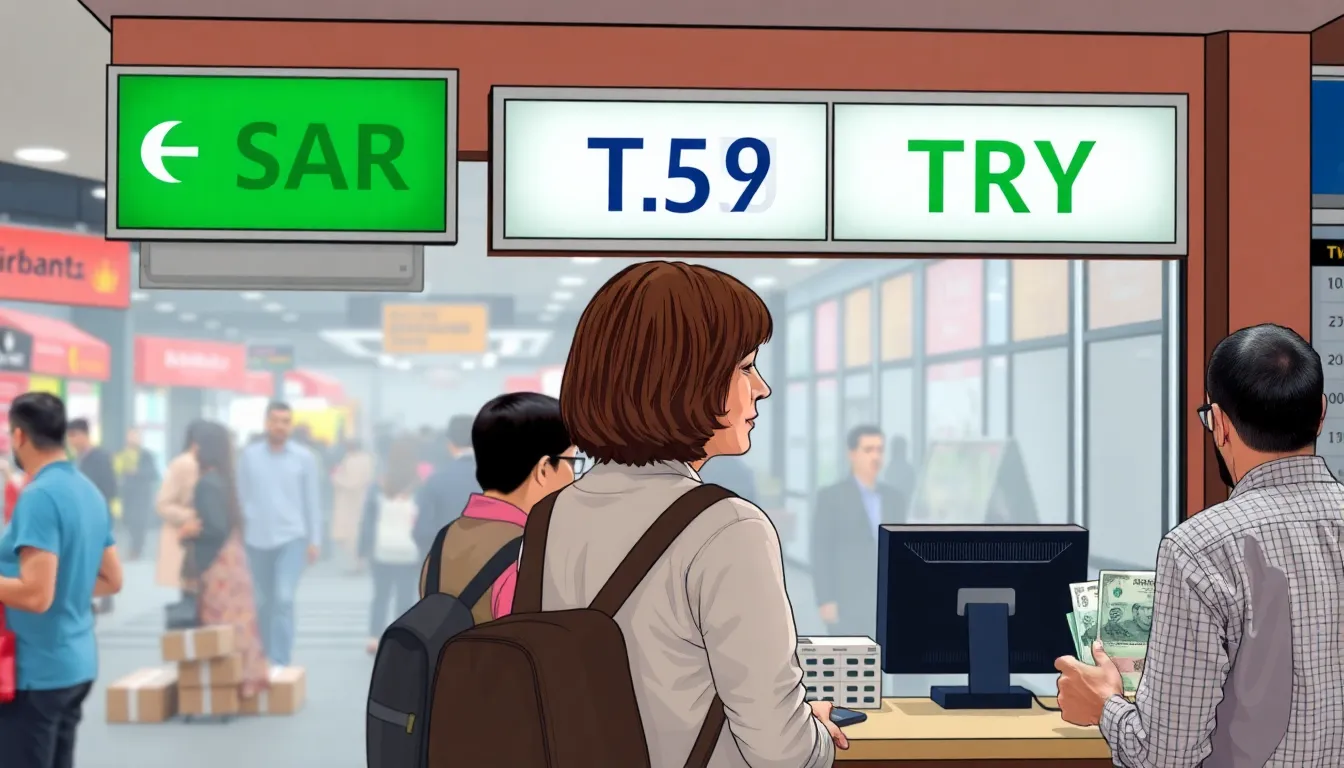Navigating the world of currency exchange can feel like trying to solve a Rubik’s Cube blindfolded. When it comes to the SAR to TRY exchange rate, things can get a bit tricky. With the Saudi Riyal and Turkish Lira dancing to their own economic beats, understanding their relationship is crucial for travelers and investors alike.
Table of Contents
ToggleOverview of SAR to TRY Exchange Rate
The exchange rate between the Saudi Riyal (SAR) and the Turkish Lira (TRY) reflects current economic conditions and political stability in both nations. Currency fluctuations occur frequently due to market dynamics, interest rates, and inflation trends. Understanding these factors enables travelers and investors to make informed decisions.
Recent data indicates the SAR to TRY exchange rate fluctuates around 5.30 SAR for 1 TRY, but this figure varies daily based on market demand. Investors should monitor these changes closely, as small shifts can have significant impacts on investment returns.
Government policies also influence currency performance. Saudi Arabia’s strong fiscal policies support the SAR, while Turkey’s economic measures can affect the stability of the TRY. Both currencies respond to regional economic conditions, including trade balances and geopolitical events.
Agency reports highlight that recent economic agreements between Saudi Arabia and Turkey aim to strengthen fiscal ties, which could affect the exchange rate positively. Each currency’s value is influenced by different factors such as oil prices for the SAR and tourism for the TRY.
Stay updated with reputable financial news sources for the latest SAR to TRY insights. Understanding the nuances of this exchange rate creates opportunities for better financial strategies in both currency markets.
Factors Influencing SAR to TRY Exchange Rate

Several factors influence the exchange rate between the Saudi Riyal (SAR) and the Turkish Lira (TRY). Understanding these elements ensures better financial strategies for travelers and investors.
Economic Indicators
Economic indicators significantly impact currency values. Inflation rates play a pivotal role in determining each nation’s monetary policy. For instance, a rise in inflation in Turkey can weaken the TRY against the SAR. Interest rates also affect exchange rates; higher rates in Saudi Arabia attract foreign investment, strengthening the SAR. Additionally, trade balances influence the exchange rate as a surplus can boost a currency’s value. Recent data highlights fluctuations, where the SAR trades around 5.30 TRY, varying daily due to these indicators.
Political Stability
Political stability affects investor confidence and currency strength. Strong governance in Saudi Arabia tends to support the SAR. In contrast, political uncertainty in Turkey can lead to depreciation of the TRY. Government policies also drive exchange rates. For example, Turkey’s economic reforms aim to stabilize the TRY amid challenges. Agreements between the two countries further enhance fiscal ties, impacting currency values. As the political landscape shifts, so do the risks associated with each currency, necessitating close monitoring of developments.
Historical Trends in SAR to TRY Exchange Rate
The historical trends of the SAR to TRY exchange rate reveal significant fluctuations influenced by various economic factors. Over the past decade, changes in this exchange rate have been evident, frequently affected by shifts in market demand.
Data shows that in recent years, the rate often hovers around 5.30 SAR for 1 TRY. Instances of depreciation or appreciation of the TRY against the SAR directly relate to Turkey’s inflation rates. A noted spike in inflation within Turkey tends to weaken the TRY, leading to higher conversion costs for those exchanging currencies.
Traders observe a consistent pattern where political stability in Saudi Arabia bolsters the SAR. For instance, periods of strong governance positively impact investor confidence and currency strength. Conversely, political uncertainty in Turkey frequently results in a decline in the TRY’s value.
Additionally, economic indicators such as interest rates play a vital role in shaping the exchange dynamics. Higher interest rates in Saudi Arabia attract foreign investments, thereby enhancing the demand for the SAR. As these investments surge, traders note an upward trend in the SAR’s value against the TRY.
The trade balance between both countries further illustrates the connection between economic conditions and currency values. A trade surplus can substantially uplift a currency’s strength. Recent government policies and economic agreements aimed at strengthening fiscal ties also influence these trends, leading to more significant changes in exchange rates.
By analyzing these historical fluctuations, investors can make more informed decisions, capitalizing on potential market movements.
How to Convert SAR to TRY
Converting Saudi Riyals (SAR) to Turkish Lira (TRY) requires an understanding of current exchange rates and available tools. Keeping up with live rates ensures accurate currency conversion.
Conversion Tools and Resources
Online currency converters like XE and OANDA provide real-time exchange rates for SAR to TRY, making them reliable options. Mobile applications such as Revolut and Currency Converter Plus also assist users in tracking conversions effectively. Banks and financial institutions typically offer exchange services at specific rates. Websites that focus on forex markets often display historical data and trends, aiding comprehension of fluctuations. Always check multiple sources to obtain the best rate possible.
Tips for Best Rates
Timing the conversion can lead to better rates. Monitoring market trends for peaks and valleys typically aids in identifying favorable times. Comparing various exchange platforms before converting helps secure competitive rates. Using an online broker may yield better deals compared to traditional banks. Avoid converting currency at airports, as rates often include significant markup fees. Lastly, exchanging larger amounts at once usually results in more favorable rates compared to frequent small transactions.
Navigating the SAR to TRY exchange rate requires a keen understanding of the economic landscape and political climate in both Saudi Arabia and Turkey. As fluctuations continue to occur based on various factors such as inflation and interest rates, staying informed is crucial for travelers and investors alike. Utilizing online tools and being strategic about currency conversions can lead to better financial outcomes. By keeping an eye on market trends and understanding the nuances of this exchange rate, individuals can make more informed decisions that align with their financial goals.



